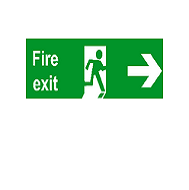<< back to Tools
Signs

December 29, 2025 - December 29, 2025
Safety signs in the work place:
There are four types of safety signs:
| RED SIGNS |
BLUE SIGNS |
 |
 |
| PROHIBITION
Things that you must not do.
e.g. No Smoking, No Entry |
MANDATORY
Things that you must do.
e.g. Keep Clear, Wear Goggles |
| YELLOW SIGNS |
GREEN SIGNS |
 |
 |
| WARNING
Warn you about a health or safety hazard.
e.g. Poisonous, Corrosive, Dangerous Substance. |
SAFE CONDITIONS
Advise you about health and safety.
e.g. Fire Exit, Smoking Area, Fire Assembly Point. |
 |
FIRE SAFETY |
Make sure the following is explained to you as part of your induction/safety talk.
- What to do if you discover a fire
- Fire warning system
- Escape route and fire exit locations
- Location of fire fighting equipment ”“ sand bucket, fire extinguisher etc.
- Assembly point after evacuation.
|
 |
PERSONAL PROTECTION EQUIPMENT |
Ensure that the protective equipment is explained to you.
- Make sure you find out why it is needed
- Learn how to wear or use the protective equipment
- This equipment is provided when a risk assessment is needed. This is a formal assessment and must be taken seriously.
- You must look after the equipment ”“ if it is broken let your employer know immediately!
|
 |
SUITABLE CLOTHING |
Make sure your uniform/suitable clothing is explained to you by your employer. There are a few obvious points for clothing when your are doing practical work.
- Don’t wear shoes in need of repair or high heels.
- Don’t wear a tight, long or other wise restrictive skirt.
- If you are working near machinery don’t wear clothes or accessories that could get caught in the machinery e.g. scarves, ties, rings or jewellery.
- Long hair should be tied back.
- Wear flat shoes if you are going to be on your feet all day.
- You may be required to wear steel toecap boots working around machinery.
|
 |
MACHINERY AND TOOLS
|
Find out in your induction/safety talk which machines you will be required to use and the rules surrounding them.
- Certain machines can only be used by people over a certain age – find out what these age limitations are.
- Find out which machines you will be trained to use and find out the risks associated.
- Some machines need a lot of training to use and you must find out
if you will be required to use these.
- Never leave a machine running unattended or when you are not using it.
|
 |
FIRST AID |
Find out about the first aid and accident reporting arrangements.
- Find out where the First Aid supplies are.
- Find out where the accident report book is and the procedure for filing an accident report.
- If you are hurt at work, tell the person you are working with.
- Make sure you are treated.
- Make sure your accident is reported.
- Make sure your supervisor is told and if necessary Fashion Enter LTD, your school, parents etc.
|
 |
LIFTING |
As a work placement student you shouldn’t be asked to do heavy lifting as this could be hazardous to your health.
- Find out who is able to lift heavy objects in case you need their help.
|
 |
MOBILE PHONES AND MP3 PLAYERS |
Find out what the policy for mobile phones and MP3 players is.
- You must be able to hear clearly what is going on around you such as instructions, emergency instructions, machinery working or malfunctioning.
- Listening to an MP3 player can put you at serious risk. This includes walking around your unfamiliar place of work with unfamiliar vehicle movement.
- Generally in a practical environment, mobile phones must be turned off and used only in designated areas and in break periods, sending or receiving a text is a distraction and therefore a hazard.
|
 |
SAFETY ESSENTIALS |
- Accidents can happen quickly before you realise.
- Be Clever! Think before you act.
- Don’t risk danger to impress your employer.
- Never risk danger to save time.
- Never play practical jokes in the work place.
- Never mess around or play in the work place.
- Always walk, never run.
- Be tidy at all times. Never leave things lying around, drawers open or chairs un-tucked. These could all be trip hazards.
- Keep your hands clean. This is very important if you are undertaking practical jobs using machinery, working with animals, or in a laboratory. You must wash your hands well before you eat meals.
- Be aware of vehicle movements e.g. fork lift trucks and activity around you.
|
<< back to Tools




































